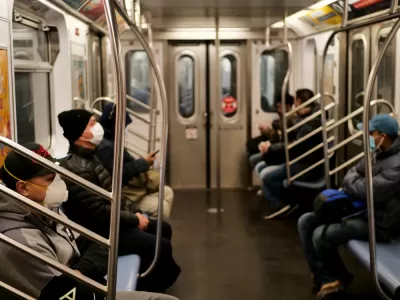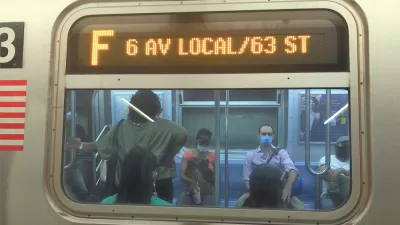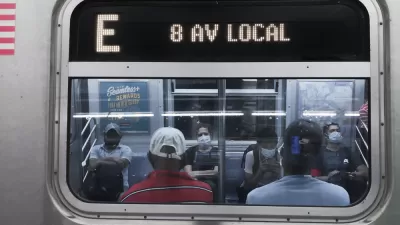The last of the ten economic regions in the Empire State opened for Phase One on June 8. Transportation planners fear massive traffic congestion as residents and workers may abandon the subway due to concerns about being infected by the coronavirus.

"Now the city faces a dilemma: Encouraging people to return to mass transit could increase the risk of new infections," observes New York Times transit reporter Christina Goldbaum on June 1. "But the region’s roads, tunnels and bridges cannot handle a surge in car traffic, and there are few alternatives."
The Metropolitan Transportation Authority, which oversees most of the system, said on [June 5] that it would be rolling out a plan to lure riders back, including ramping up service to reduce congestion, deploying the police to enforce mask usage and stationing workers across the subway to report overcrowding.
"NYC Transit employees, NYPD, MTA Police and contract security will be stationed on platforms to assist with crowd control, but we need help from our riders," is part of the fourth point, "Enhanced Safety & Security," in the authority's new "13-Point Action Plan for a Safe Return." "That includes waiting for the next train or bus if one is too crowded, or walking to a different car."
Phase 1
By entering Phase One, there will be more traveling—commuters will be returning to work at non-essential industries including:
- Construction
- Retail - (Limited to curbside or in-store pickup or drop off)
- Manufacturing
- Wholesale Trade
If the commuters follow the Centers for Disease Control and Prevention recommendations which essentially call for drive-alone commuting, traffic congestion will increase considerably. The CDC recently amended the guidelines to acknowledge walking, biking, and driving with household members as safe alternatives to driving alone.
“Encouraging people, especially those without cars and in congested areas like New York, not to take public transit is misguided,” said Patrick J. Foye, chairman of the M.T.A., which is controlled by Gov. Andrew M. Cuomo. “Transit is, and has long been, the safest way to move around any city. Our transit and bus system is cleaner and safer than it has been in history, as we clean and disinfect around the clock.”
But Mayor Bill de Blasio wasn't boosting transit. “Some people are going to be comfortable on mass transit, some are not,” Mr. de Blasio told reporters. “You may see people use their cars more in the short term.”
Subway ridership is down by 90 percent, notes Goldbaum. Last month two surveys indicated that "nearly half of New Yorkers said they would avoid public transportation when the city comes back to life," she adds.
Safer transportation alternatives in the pandemic
Rather than promoting public transit, the article highlights driving alternatives that can be done individually, thereby obviating the need for social distancing.
The city’s transportation commissioner, Polly Trottenberg, said the de Blasio administration is committed to examining how the city can capitalize on the recent shift toward bikes and other forms of “micro-mobility.”
“Absolutely this is a critical juncture,” Ms. Trottenberg said. “How do we reopen our city and our economy, while keeping the positive things we have recently experienced — streets that are safer, quieter and can better serve bus riders, cyclists and pedestrians?”
Goldbaum writes that on social media there is much discussion on purchasing motor vehicles to avoid taking transit or to escape the city on weekends. Experts warn that the city needs to act quickly to revamp its streets to encourage non-driving modes.
“In my 50-year career in New York City, there have been several moments” like this, said Samuel I. Schwartz, a consultant and former city traffic commissioner. “We should seize this moment. The question will be whether there is the political will to do so.”
Related in Planetizen:
-
Did the CDC Toll the Death Knell for Public Transit? June 2, 2020
-
Subway-Coronavirus Connection Suffers From Lack of Evidence, April 20, 2020
Hat tip to Kenyon Karl.
FULL STORY: Can 8 Million Daily Riders Be Lured Back to N.Y. Mass Transit?

Alabama: Trump Terminates Settlements for Black Communities Harmed By Raw Sewage
Trump deemed the landmark civil rights agreement “illegal DEI and environmental justice policy.”

Study: Maui’s Plan to Convert Vacation Rentals to Long-Term Housing Could Cause Nearly $1 Billion Economic Loss
The plan would reduce visitor accommodation by 25% resulting in 1,900 jobs lost.

Planetizen Federal Action Tracker
A weekly monitor of how Trump’s orders and actions are impacting planners and planning in America.

Wind Energy on the Rise Despite Federal Policy Reversal
The Trump administration is revoking federal support for renewable energy, but demand for new projects continues unabated.

Passengers Flock to Caltrain After Electrification
The new electric trains are running faster and more reliably, leading to strong ridership growth on the Bay Area rail system.

Texas Churches Rally Behind ‘Yes in God’s Back Yard’ Legislation
Religious leaders want the state to reduce zoning regulations to streamline leasing church-owned land to housing developers.
Urban Design for Planners 1: Software Tools
This six-course series explores essential urban design concepts using open source software and equips planners with the tools they need to participate fully in the urban design process.
Planning for Universal Design
Learn the tools for implementing Universal Design in planning regulations.
Caltrans
Smith Gee Studio
Institute for Housing and Urban Development Studies (IHS)
City of Grandview
Harvard GSD Executive Education
Toledo-Lucas County Plan Commissions
Salt Lake City
NYU Wagner Graduate School of Public Service





























